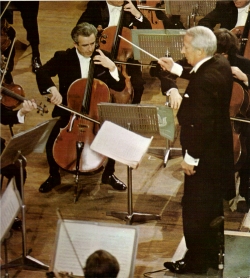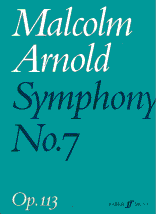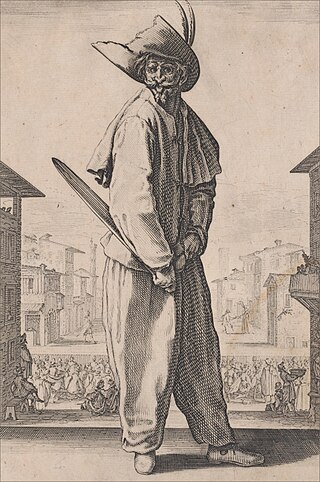Related Research Articles

Sir Malcolm Henry Arnold was an English composer. His works feature music in many genres, including a cycle of nine symphonies, numerous concertos, concert works, chamber music, choral music and music for brass band and wind band. His style is tonal and rejoices in lively rhythms, brilliant orchestration, and an unabashed tunefulness. He wrote extensively for the theatre, with five ballets specially commissioned by the Royal Ballet, as well as two operas and a musical. He also produced scores for more than a hundred films, among these The Bridge on the River Kwai (1957), for which he won an Oscar.

The Royal Scottish National Orchestra (RSNO) is a Scottish orchestra, based in Glasgow. It is one of the five national performing arts companies of Scotland. Throughout its history, the Orchestra has played an important part in Scotland’s musical life, including performing at the opening ceremony of the Scottish Parliament building in 2004.
A London Symphony is the second symphony that Ralph Vaughan Williams composed. The work is sometimes referred to as Symphony No. 2, though the composer did not designate that name for the work. First performed in 1914, the original score of this four-movement symphony was lost and subsequently reconstructed. Vaughan Williams continued revisions of the work into its final definitive form, which was published in 1936.
Tam o' Shanter is a 1790 poem by Robert Burns.

"Tam o' Shanter" is a narrative poem written by the Scottish poet Robert Burns in 1790, while living in Dumfries. First published in 1791, at 228 lines it is one of Burns' longer poems, and employs a mixture of Scots and English.

The Symphony No. 6, Op. 95 by Malcolm Arnold was written in 1967, and finished in July of that year. It is in three movements:

Cockaigne (In London Town), Op. 40, also known as the Cockaigne Overture, is a concert overture for full orchestra written by the British composer Edward Elgar in 1900–1901.
Patrick Arthur Sheldon Hadley was a British composer.
Froissart, Op. 19, is a concert overture by Edward Elgar, inspired by the 14th-century Chronicles of Jean Froissart. Elgar was first attracted to the Chronicles after finding mention of them in Walter Scott's Old Mortality.

The Symphony No. 2, Op. 40 by Malcolm Arnold is a symphony dating from 1953. Arnold composed the symphony on commission from the Bournemouth Winter Garden's Society. He dedicated the score to the Bournemouth Symphony Orchestra and conductor Charles Groves, who premiered the work on 25 May 1953.

The Symphony No. 7, Op. 113 by Malcolm Arnold was finished in 1973. It is in three movements:
John Wilson is a British conductor, arranger and musicologist, who conducts orchestras and operas, as well as big band jazz. He is the creator of the John Wilson Orchestra and Associate Guest Conductor of the BBC Scottish Symphony Orchestra.

Robert Augustine Irving, DFC*, was a British conductor whose reputation was mainly as a ballet conductor.
Margaret Fingerhut is a British classical pianist. She is known for her innovative recital programmes and recordings in which she explores lesser known piano repertoire.

The conductor Malcolm Sargent's career as a recording artist began in the days of acoustic recording, shortly before the introduction of the microphone and electrical recording, and continued into the stereo LP era. He recorded prolifically from 1924 until 1967, the year of his death.
Luonnotar, Op. 70, is a tone-poem for soprano and orchestra written in 1913 by the Finnish composer Jean Sibelius. It was dedicated to Aino Ackté, who premiered the work at the Three Choirs Festival in Gloucester, England on 10 September 1913, with an orchestra conducted by Herbert Brewer. Sibelius arranged it for voice and piano in 1915.
John Hollingsworth was a British orchestral conductor prominent in the concert hall, the ballet and opera theatre, and the film studio. He was Sir Malcolm Sargent's assistant conductor at The Proms, where he conducted over 60 times including some world and British premieres. He also conducted at the Royal Opera and Sadlers Wells, and became associated with music for British horror films of the 1950s and early 1960s.

Scapino is a short work for large orchestra by William Walton, described by the composer as a "comedy overture". It was commissioned by the Chicago Symphony Orchestra and was first performed in 1941. A revised version was premiered in 1950.

The Finnish composer Jean Sibelius (1865–1957) was one of the most important symphonists of the early twentieth century: his seven symphonies, written between 1899 and 1924, are the core of his oeuvre and stalwarts of the standard concert repertoire. Many of classical music's conductor–orchestra partnerships have recorded the complete set, colloquially known as the "Sibelius cycle". Specifically, the standard cycle includes:
Peterloo, Op. 97, is a concert overture by Malcolm Arnold written in 1968 to commemorate the centenary of the first meeting of the Trades Union Congress. It is a programme piece which depicts the Peterloo Massacre of 1819. It was given a mixed reception by critics, but has nevertheless become one of Arnold's best-known works, being arranged several times for wind or brass band, recorded many times, and played twice at the Proms, once in its original form and once in a choral arrangement to words by Sir Tim Rice.